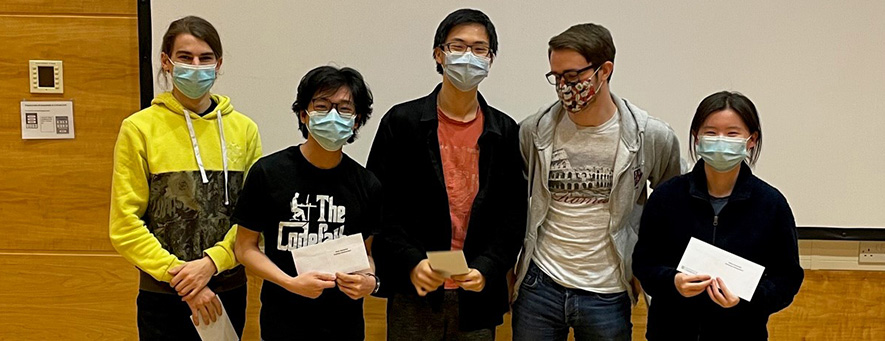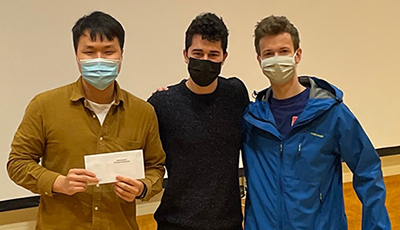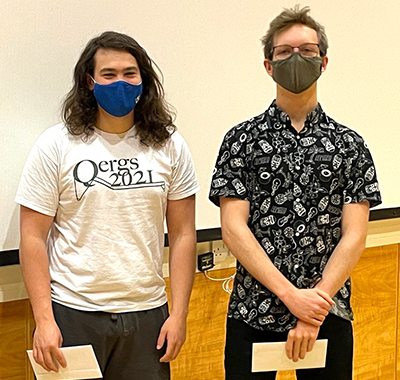
Submitted by Rachel Gardner on Wed, 16/03/2022 - 13:49
A system to help the RSPB count vulnerable birds. An app for users to compare the carbon costs of travelling by bike, car or public transport. And a tool to help people in rural Bangladesh report climate change effects.
These were among the projects recognised today at the Part 1B Group Project Awards. This annual event celebrates the group design projects our second-year undergraduates carry out as part of their practical work.
Each group of students has spent the past term working with a client to develop a product based on an initial design brief. And today there were prizes for those projects that were judged to be the most successful.
Most Impressive Technical Achievement
Nominations for this award included Team Charlie (with their Empathetic Chatbot) and Team Lima (for their Personal Ambiguator). But the winners were Team India for their Bird Migration Simulation tool. Congratulations to Skye Purchase, Andy Lo, Jude Tyrrell, Jedidiah Koh, Matthew Titmas and Vivian Li. (The team is pictured above.)
Working with the RSPB, the team was tasked with creating a simulation tool that would help accurately count the number of Yelkouan shearwaters (birds currently classified as vulnerable) flying through the Bosphorus strait during their annual migration.
There is existing video footage of the birds – but identifying and counting them from the footage alone is difficult. There are many other birds (e.g. gulls) also flying there, and picking out the shearwaters clearly against a background of moving waves and passing ships is tricky.
The team’s demonstration of the tools and techniques they used to do this in the creation of their simulator was indeed impressive.
Most Impressive Professional Achievement
Nominations for this award included Team Bravo (for their Conservation Evidence Synthesis) and Team Foxtrot (for their Global Ground Truth app). But the winners were Team Golf for their Green Maps app. Congratulations to Dieu Ha, Horea Silaghi, Jacob Brown, Linus Leong, Miroslav Macko and Qianyi Liu.
 In an effort to tackle climate change, they were asked by client IMC to develop a system that could offer users who were planning a journey insights into the carbon footprints associated with different forms of transport – e.g. cycling, driving or going by train or plane. It would also compute the costs and travel time as well to help users make informed decisions about how to travel.
In an effort to tackle climate change, they were asked by client IMC to develop a system that could offer users who were planning a journey insights into the carbon footprints associated with different forms of transport – e.g. cycling, driving or going by train or plane. It would also compute the costs and travel time as well to help users make informed decisions about how to travel.
The app the team came up with was impressively detailed – drivers can enter the make, model and year of their car to get a more accurate carbon cost of their chosen route. The data used to estimate the carbon emissions for cars is extracted from an EU database of vehicles with more than 11 million records and the calculation of carbon cost also takes traffic conditions into account as well as journey length.
Best Contribution to a Better Future
Nominations for this award included Team Golf (for their Green Maps app) and Team November (for SMART Climate Goals). But the winners were Team Foxtrot for their project Global Ground Truth. Congratulations to Balint Molnar, Cameron Round, Florence Miller, Harry Knighton, Michal Mgeladze-Arciuch and Saomiyan Mathetharan.
 The students worked with a client from the International Centre for Climate Change and Development in Dhaka, Bangladesh. Their brief was to develop a tool that could collect information about climate change effects, including photos and voice recordings, from people in rural areas. This is seen an important as indigenous people often have valuable knowledge about climate change effects and adaptation, but it is not straightforward to integrate their observations into scientific evidence and policy frameworks.
The students worked with a client from the International Centre for Climate Change and Development in Dhaka, Bangladesh. Their brief was to develop a tool that could collect information about climate change effects, including photos and voice recordings, from people in rural areas. This is seen an important as indigenous people often have valuable knowledge about climate change effects and adaptation, but it is not straightforward to integrate their observations into scientific evidence and policy frameworks.
The students had to create an app that could run on low-end android phones, and to be accessible to people with low literacy. To this end, they initially considered using icons only to collect information, but felt it might not gather much detail. So instead they aimed the app at researchers who could help translate the app’s questions into local languages and input the information from local people into the tool.
All 20 of this year’s projects were very impressive, and as organiser Professor Alan Blackwell told students at the close of the awards ceremony, "Your efforts and enthusiasm have made this exercise so worthwhile. I wish I could give an award to ALL of you."

